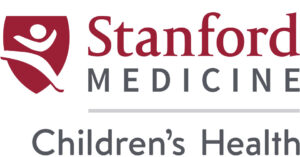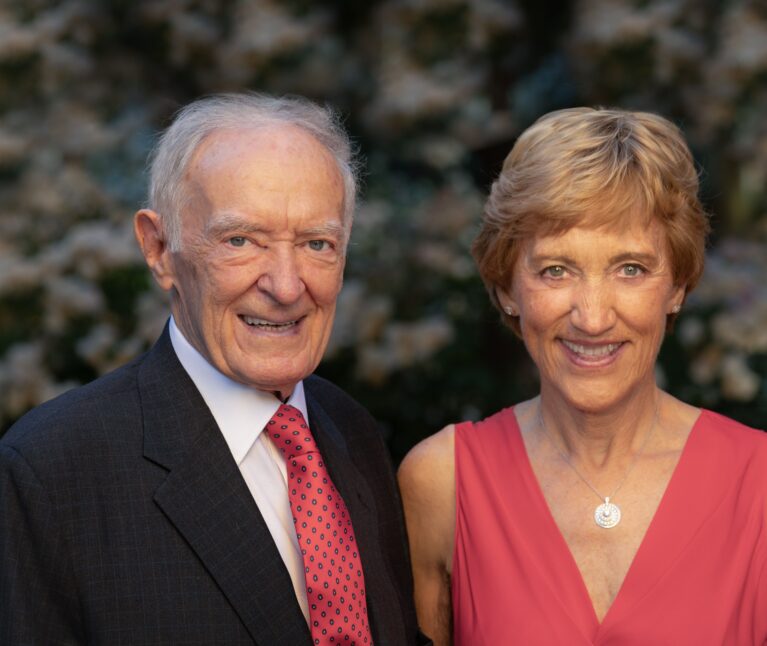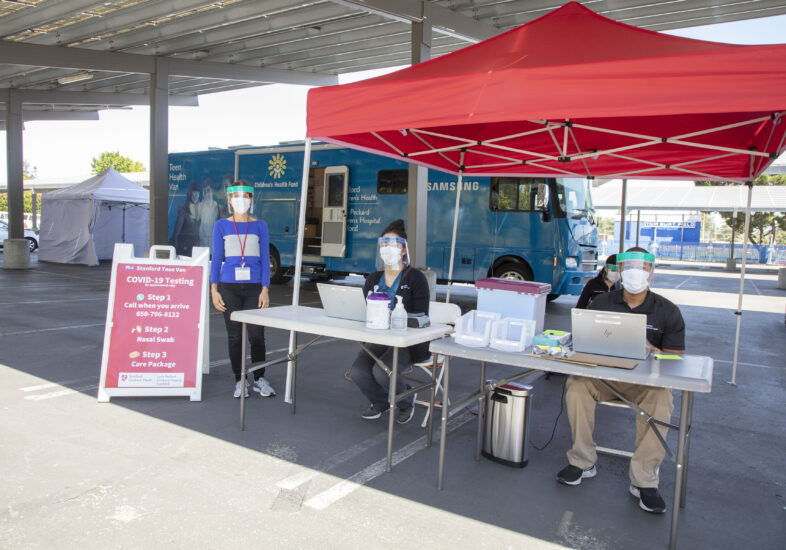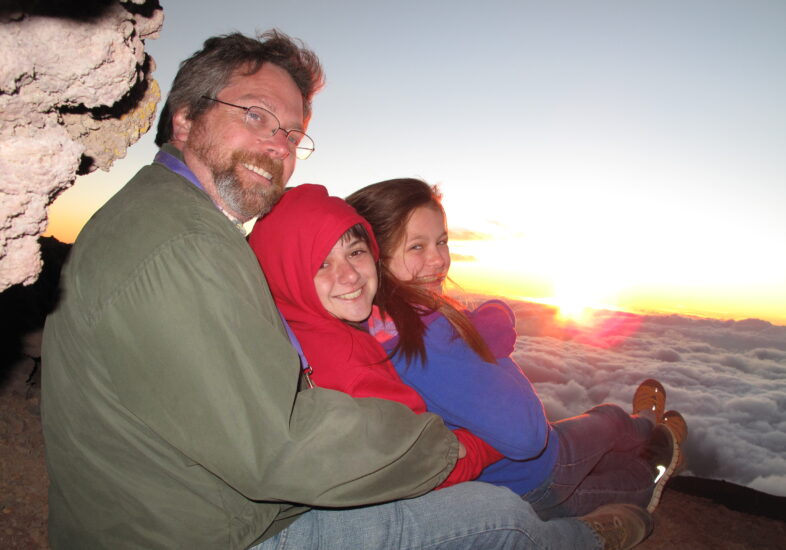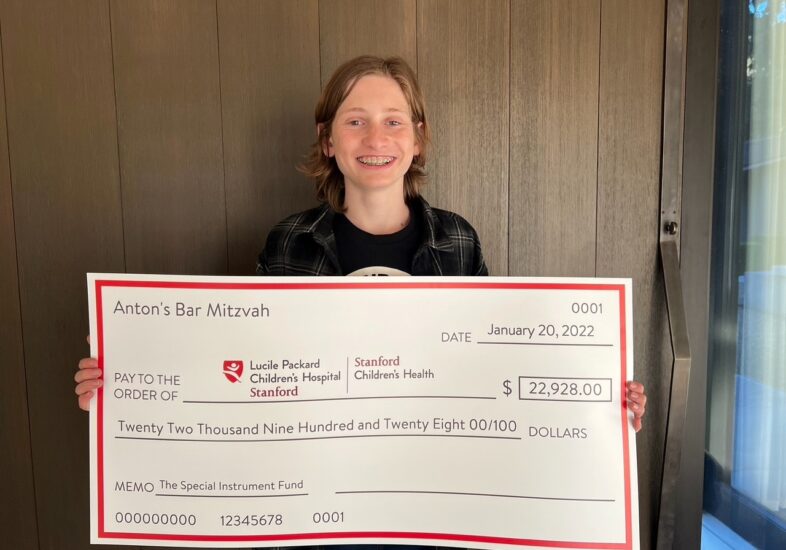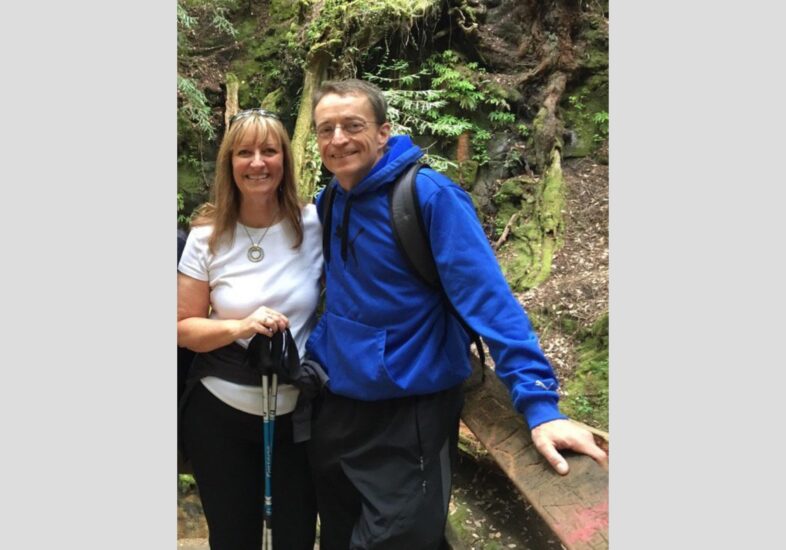Every day, donors like you make gifts of all sizes to build a healthier future for children and expectant mothers. Your support makes our hospital a special place for our patients and families, and we are tremendously grateful.
Trailblazing Couple Names Professorship
Sarah Donaldson, MD, is grateful for the opportunities she has received in life. She has spent her entire career as an academic radiation oncologist at Stanford, providing extraordinary care to her patients and helping physicians grow in their careers. In fact, Sarah was pivotal in the development and growth of the oncology program at Lucile Packard Children’s Hospital. Most recently, Sarah decided to further support the program through her estate plans by endowing a professorship in pediatric radiation oncology.
Sarah’s career in medicine goes back more than 50 years. She enjoyed her pathway into health care as a nurse, but one day her mentor suggested that she apply to medical school. The idea took her by surprise since there were few female physicians at the time. When she left the Oregon Health Science Center for Dartmouth Medical School, she was one of only a few women in her class. She completed the two-year program at Dartmouth and finished her medical studies at Harvard Medical School.
Then Sarah came to Stanford University for residency training in radiation therapy. She went on to become internationally renowned for her research, which has led to a greater understanding of the long-term effects of treatment for pediatric cancers and to the development of safe and effective treatment regimens for children.
Sarah served as chief of radiation oncology at Packard Children’s Hospital from 1981 to 2018 and retired in 2021 as the Catharine and Howard Avery Professor, Emerita at the Stanford University School of Medicine. She continues to be involved with the radiation oncology department’s mentorship program.
Sarah and her partner, Jacob “Jake” Haimson, both have careers in radiation therapy. Jake is a pioneer in the development of medical microwave electron linear accelerators—the same machines that Sarah used in radiation therapy treatments. Jake was appointed head of the Massachusetts Institute of Technology’s accelerator physics program, prior to starting his own company.
Recently, as part of their long-range planning, the couple committed funding to endow the Sarah S. Donaldson and Jacob Haimson Professorship within the Department of Radiation Oncology.
“The strength of the institution comes from the people leading the institution,” Sarah says. “We must recruit and retain the very best faculty. I cannot think of a more important gift one can give than creating an endowed chair.”
Thank you, Sarah and Jake, for using your estate plans to bring the brightest faculty in radiation oncology to Stanford and advanced care to children with cancer!
Donors Help Teen Van Mobilize Care During the Pandemic
For more than two decades, the Stanford Children’s Health Teen Van has been a vital resource for youth in communities across the Bay Area. During the COVID-19 pandemic, the Teen Van has stepped up in an even bigger way—providing COVID-19 testing, food, face masks, and other supplies for local families. This wouldn’t have been possible without generous support from donors, including the Westly Foundation and Chan Zuckerberg Initiative (CZI).
The Westly Foundation is a longtime supporter of the Teen Van. In 2020, at the start of the pandemic, the foundation more than doubled its annual commitment to $100,000 to facilitate mobile COVID-19 testing using the Teen Van.
The Chan Zuckerberg Initiative Community Fund recently gave the Teen Van a $100,000 grant to provide San Mateo County’s residents with resources and services to support their basic needs.
The Teen Van travels to nine sites in Santa Clara and San Mateo counties, including local high schools and youth centers, providing no-cost vaccines, mental health care, contraceptives, physical exams, nutritional counseling, and more to patients ages 12 to 25. Since its inception, there have been more than 15,000 visits to the Teen Van, with more than 4,500 unique patients served, about 40 percent of whom are homeless or have been homeless in the past year.
Thank you, Westly Foundation and CZI, for helping families to obtain health care and other necessities.
Baxter Healthcare Donates to Promote Health Equity
In January, Baxter Healthcare made a $100,000 gift to the Stanford School of Medicine Department of Pediatrics’ new Health Equity Advanced through Learning (HEAL) Initiative. The program is under the leadership of Baraka Floyd, MD, MSc, associate chair for Diversity, Equity, Inclusion, and Justice, and Allison Guerin, EdD, MEd, director of the Office of Pediatric Education and the Office of Diversity, Equity, Inclusion, and Justice.
The HEAL Initiative is a four-pronged approach to health equity education, including a seminar, email challenge, health equity rounds, and clinical huddle guides. The initiative is poised to build a culture of reflection, learning, and action within the Department of Pediatrics and at Stanford Children’s Health.
Baxter’s gift will primarily support the faculty leads for health equity rounds: Rebecca Kameny, MD, and Amit Singh, MD. Health Equity Rounds are one-hour sessions that allow members of the health care team to identify how bias and structural racism impact patient care.
Baxter Healthcare, a company based in Deerfield, Illinois, made this gift as part of its Activating Change Initiative to advance racial justice. “Baxter’s support gives this program the momentum to provide the skills for our health care team members to make a lasting impact on standards of equity in the care we provide,” says Floyd. Thank you, Baxter Healthcare, for advancing racial justice and supporting our health care providers in their continuous learning and growth.
Helping Physicians Connect and Find Answers to Rare Condition in Children
We thank Keith Moore and the PANDAS Physicians Network for raising awareness and educating physicians across the country about pediatric acute-onset neuropsychiatric syndrome (PANS). This disease is characterized by the sudden onset of obsessive-compulsive symptoms or eating restrictions, accompanied by other sudden changes in the child’s behavior.
Keith serves as director of research at the PANDAS Physicians Network (PPN), an organization dedicated to improving the diagnosis and treatment of children with pediatric autoimmune neuropsychiatric disorders associated with streptococcal infections (PANDAS) and PANS. Keith highlights that “our goal at PANDAS Physicians Network is to reduce the suffering of a generation of children by supporting the accurate diagnosis of pediatric mental health issues caused by infection.”
“Keith is passionate about furthering PANS research and has been a vital link between Stanford researchers and the PANDAS Physician Network,” says Jennifer Frankovich, MD, MS, director of the PANS Research Program and co-director of the Immune Behavioral Health Clinic at Lucile Packard Children’s Hospital.
Over the years, PPN has generously supported the work of Frankovich, who co-founded the Immune Behavioral Health Clinic in 2012, the first clinic of its kind in the country. She and her collaborators have created a large biorepository of patient and control biospecimens, which can be used by researchers to gain a better understanding of PANS.
This past year, PPN awarded Frankovich with the PANDAS Physicians Network 2021 research grant for $150,000 for her work to healthy control samples to build out the biorepository.
We are grateful for this grant and the many contributions Keith and PPN have made to the Stanford Immune Behavioral Health team. Their support has helped Frankovich and researchers across the country find better diagnostic and treatment options for children with PANS.
Supporting Families Following an Autism Diagnosis
For many years, the John and Marcia Goldman Foundation has made gifts to fund the Early Support Program for Autism (ESPA).
Led by Stanford pediatric psychiatrist Antonio Hardan, MD, ESPA provides free bilingual support and guidance to families whose child has been newly diagnosed with autism. The program’s two-pronged approach helps parents navigate a complicated web of community services and educates parents and caregivers on the best ways to interact with their child. Since it launched in 2014, ESPA has served almost 4,000 families.
“I spent 25 years as an autism educator, so I have seen firsthand the challenges it places on children and their parents, especially immediately after they receive a diagnosis,” says Marcia. “John and I wanted to support these families by funding ESPA.”
Research has shown that early intervention makes a profound difference for children with autism. Building on the success of ESPA, the Preschool Autism Lab (PAL) program was created in 2019, thanks again to funding from the John and Marcia Goldman Foundation. The program creates an early intervention classroom environment that integrates autism research and clinical activities to develop and evaluate therapies.
Thank you, John and Marcia, for helping families find and access quality services and advancing research that will lead to more effective therapies for children with autism.
Teen Raises Funds for Music Therapy Instead of Receiving Gifts
From playing piano and drums to composing songs, music has been a big part of Anton Popowitz’s life. It was only natural that the 13-year-old would raise money to support the music therapy program at Lucile Packard Children’s Hospital for his bar mitzvah project.
“When I play music, I feel free from all of the difficult things that are happening in the world,” Anton says. “I believe that music can help people get through hard times as it has for me many times in the past.”
At Packard Children’s Hospital, trained music therapists use music to help patients and families cope with hospitalization. Anton became aware of our hospital’s music therapy program when a family friend was diagnosed with cancer and treated at our hospital. “He would dance and sing with his mom as he went through chemotherapy and other treatments,” Anton says.
Anton’s passion for music and his connection to Packard Children’s Hospital led him to support the Special Instrument Fund for his bar mitzvah project. Anton raised nearly $23,000—enough to maintain, repair, and replace shared instruments for an entire year, as well as provide longer-stay patients with instruments that they can keep.
Thank you, Anton, for bringing the healing benefits of music to our patients.
Increasing Access to Spiritual Care for Spanish-Speaking Families
Thanks to generous support from Linda and Patrick Gelsinger, Lucile Packard Children’s Hospital Stanford recently expanded its chaplaincy program and palliative care services to better serve Spanish-speaking families. Nearly 45 percent of the families who receive care at Lucile Packard Children’s Hospital speak Spanish.
The Gelsingers’ $400,000 gift provided funds for Edgar Burgara, MDiv, a Spanish-speaking chaplain, to join our hospital’s team. Burgara works alongside chaplains Hugo Gonzalez, MDiv, MA, BCC, who has provided spiritual care to our Spanish-speaking families for 10 years, and Valeria Faraci Sindra, who is fluent in not only English and Spanish, but Portuguese as well.
Hospital chaplains are an important spiritual- and emotional-care resource for our families and care team members. They come from a variety of spiritual backgrounds, but they support people of all faiths. Our Spanish-speaking chaplains play an invaluable role in ensuring families receive holistic care that supports their values and spiritual preferences.
“At Packard Children’s Hospital, chaplains see families in their most hopeful, joyful, grief-filled, and complicated moments,” says Linda. “We are pleased to help chaplains connect with many of these families in their primary language.”
Thank you, Linda and Patrick, for your commitment to providing spiritual care to children and their families.
This article originally appeared in the Spring 2022 issue of Packard Children’s News.
